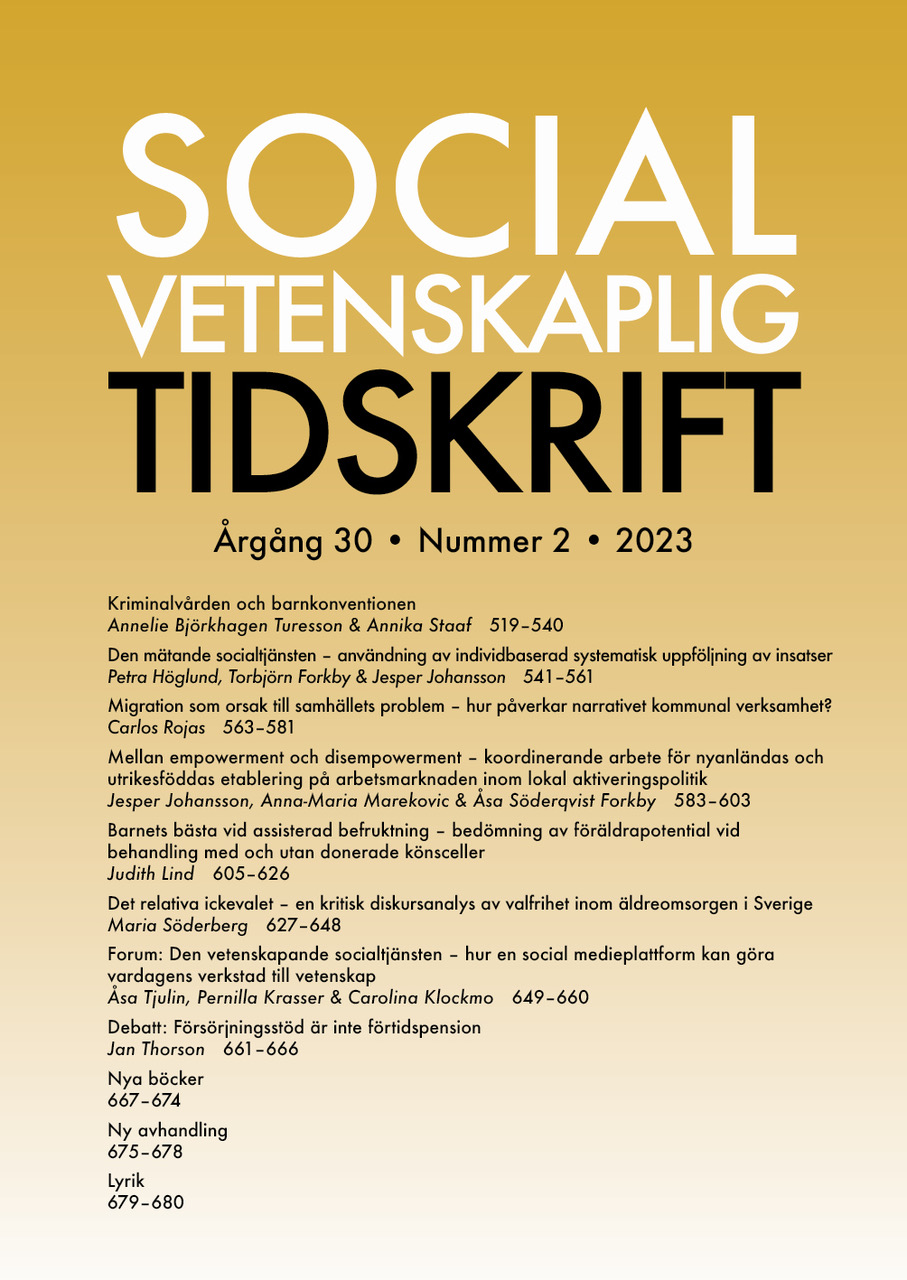Mellan empowerment och disempowerment
- koordinerande arbete för nyanländas och utrikesföddas etablering på arbetsmarknaden inom lokal aktiveringspolitik
DOI:
https://doi.org/10.3384/SVT.2023.30.2.4421Nyckelord:
empowerment, disempowerment, coordinating work, newly arrived migrants, foreign-born jobseekers, local activation policyAbstract
Between empowerment and disempowerment – coordinating work for the establishment of newly-arrived migrants and foreign-born people in the labour market within local activation policy
Increasing the employment rate and community establishment, as well as decreasing economic and social vulnerability, among newly-arrived migrants and foreign-born jobseekers are the objectives behind several local activation initiatives and projects around Sweden. This article is based on a study of a local activation project, primarily consisting of analyses of interviews with professional coordinators and other project actors. The aim of the article is to deepen the knowledge of the coordinated working method in local activation policy by critically analysing how different ideas about empowerment are part of the method and what significance this has in relation to newly-arrived migrants and foreign-born job seekers. The results show that the coordinating approach is based on principles that place the job-seeking individual's needs at the centre and that there is a tension in the working method between activation and labour market establishment, and social support and care. The studied activation project is based on both a liberal and radical ideology of empowerment. In practising the coordinating approach, however, a liberal ideology and understanding of empowerment dominate through its strong individual focus. The radical empowerment ideology with its structure-changing ambitions regarding the participants’ increased self-sufficiency, independence and empowerment are to a limited extent enforced within the project. The authors argue for the difficulties of using the concept of empowerment and its far-reaching liberation ambitions within the context of activation policy. Nevertheless, disciplining requirements and rules around self-sufficiency, individualised responsibility takeover and requirements for reciprocity within the activation of activities rather risk consolidating conditions of disempowerment for already vulnerable groups of job seekers.
Downloads
Publicerad
Referera så här
Nummer
Sektion
Licens
Copyright (c) 2023 Jesper Johansson, Anna-Maria Marekovic, Åsa Söderqvist Forkby

Det här verket är licensierat under en Creative Commons Erkännande 4.0 Internationell-licens.
Allt material i Socialvetenskaplig tidskrift publiceras sedan 2022 (Vol 28 Nr 2) med omedelbar öppen tillgång (open access), under Creative Commons-licensen CC BY 4.0. Upphovsrätten till innehållet tillhör respektive författare.
Allt innehåll i tidskriften är fritt tillgängligt utan kostnad och får fritt läsas, laddas ned, kopieras, delas, skrivas ut och länkas. När innehållet används måste författare, källa och licens anges. Författaren kan fritt göra sin publicerade text tillgänglig på institutionella och internetbaserade arkiv, exempelvis sitt lärosätes digitala arkiv eller andra tjänster för detta.
Inga publiceringsavgifter tas ut vid publicering i Socialvetenskaplig tidskrift.


